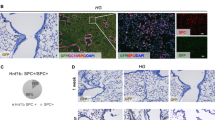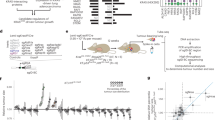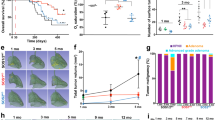Abstract
Pulmonary adenoma susceptibility 1 (Pas1) is the major mouse lung cancer susceptibility locus on chromosome 6 (ref. 1). Kras2 is a common target of somatic mutation in chemically induced mouse lung tumors2,3 and is a candidate Pas1 gene4. M. spretus mice (SPRET/Ei) carry a Pas1 resistance haplotype for chemically induced lung tumors5. We demonstrate that the SPRET/Ei Pas1 allele is switched from resistance to susceptibility by fixation of the parental origin of the mutant Kras2 allele. This switch correlates with low expression of endogenous Kras2 in SPRET/Ei. We propose that the Pas1 modifier effect is due to Kras2, and that a sensitive balance between the expression levels of wild-type and mutant alleles determines lung tumor susceptibility. These data demonstrate that cancer predisposition should also be considered in the context of somatic events and could have major implications for the design of human association studies to identify cancer susceptibility genes.
This is a preview of subscription content, access via your institution
Access options
Subscribe to this journal
Receive 12 print issues and online access
$209.00 per year
only $17.42 per issue
Buy this article
- Purchase on Springer Link
- Instant access to full article PDF
Prices may be subject to local taxes which are calculated during checkout



Similar content being viewed by others
Accession codes
Accessions
GenBank/EMBL/DDBJ
References
Gariboldi, M. et al. A major susceptibility locus to murine lung carcinogenesis maps on chromosome 6. Nat. Genet. 3, 132–136 (1993).
You, M., Candrian, U., Maronpot, R.R., Stoner, G.D. & Anderson, M.W. Activation of the Ki-ras protooncogene in spontaneously occurring and chemically induced lung tumors of the strain A mouse. Proc. Natl. Acad. Sci. USA 86, 3070–3074 (1989).
You, M. et al. Mutagenesis of the K-ras protooncogene in mouse lung tumors induced by N-ethyl-N-nitrosourea or N-nitrosodiethylamine. Carcinogenesis 13, 1583–1586 (1992).
Ryan, J., Barker, P.E., Nesbitt, M.N. & Ruddle, F.H. KRAS2 as a genetic marker for lung tumor susceptibility in inbred mice. J. Natl. Cancer Inst. 79, 1351–1357 (1987).
Wang, M. et al. Fine mapping and identification of candidate pulmonary adenoma susceptibility 1 genes using advanced intercross lines. Cancer Res. 63, 3317–3324 (2003).
Manenti, G. et al. Haplotype sharing suggests that a genomic segment containing six genes accounts for the pulmonary adenoma susceptibility 1 (Pas1) locus activity in mice. Oncogene 23, 4495–4504 (2004).
Johnson, L. et al. Somatic activation of the K-ras oncogene causes early onset lung cancer in mice. Nature 410, 1111–1116 (2001).
Jackson, E.L. et al. Analysis of lung tumor initiation and progression using conditional expression of oncogenic K-ras. Genes Dev. 15, 3243–3248 (2001).
You, M. et al. Parental bias of Ki-ras oncogenes detected in lung tumors from mouse hybrids. Proc. Natl. Acad. Sci. USA 89, 5804–5808 (1992).
Zhang, Z. et al. Positional cloning of the major quantitative trait locus underlying lung tumor susceptibility in mice. Proc. Natl. Acad. Sci. USA 100, 12642–12647 (2003).
Wang, M., Futamura, M., Wang, Y. & You, M. Pas1c1 is a candidate for the mouse pulmonary adenoma susceptibility 1 locus. Oncogene 24, 1958–1963 (2005).
Maria, D.A. et al. Pulmonary adenoma susceptibility 1 (Pas1) locus affects inflammatory response. Oncogene 22, 426–432 (2003).
Hennings, H. et al. FVB/N mice: an inbred strain sensitive to the chemical induction of squamous cell carcinomas in the skin. Carcinogenesis 14, 2353–2358 (1993).
Nagase, H. et al. Distinct genetic loci control development of benign and malignant skin tumours in mice. Nat. Genet. 10, 424–429 (1995).
Demant, P. Cancer susceptibility in the mouse: genetics, biology and implications for human cancer. Nat. Rev. Genet. 4, 721–734 (2003).
Dragani, T.A. 10 years of mouse cancer modifier loci: human relevance. Cancer Res. 63, 3011–3018 (2003).
Manenti, G., Falvella, F.S., Gariboldi, M., Dragani, T.A. & Pierotti, M.A. Different susceptibility to lung tumorigenesis in mice with an identical Kras2 intron 2. Genomics 29, 438–444 (1995).
Manenti, G. et al. Genetic mapping of lung cancer modifier loci specifically affecting tumor initiation and progression. Cancer Res. 57, 4164–4166 (1997).
Czarnomska, A. et al. Opposite effects of modifiers of the ApcMin mutation in intestine and mammary gland. Cancer Res. 63, 4533–4537 (2003).
Quintanilla, M., Brown, K., Ramsden, M. & Balmain, A. Carcinogen-specific mutation and amplification of Ha-ras during mouse skin carcinogenesis. Nature 322, 78–80 (1986).
Guerrero, I., Villasante, A., Corces, V. & Pellicer, A. Loss of the normal N-ras allele in a mouse thymic lymphoma induced by a chemical carcinogen. Proc. Natl. Acad. Sci. USA 82, 7810–7814 (1985).
Li, J. et al. LOH of chromosome 12p correlates with Kras2 mutation in non-small cell lung cancer. Oncogene 22, 1243–1246 (2003).
Diaz, R. et al. Inhibition of Ras oncogenic activity by Ras protooncogenes. Int. J. Cancer 113, 241–248 (2005).
Zhang, Z. et al. Wildtype Kras2 can inhibit lung carcinogenesis in mice. Nat. Genet. 29, 25–33 (2001).
Wang, Y. & You, M. Alternative splicing of the K-ras gene in mouse tissues and cell lines. Exp. Lung Res. 27, 255–267 (2001).
Bystrykh, L. et al. Uncovering regulatory pathways that affect hematopoietic stem cell function using 'genetical genomics'. Nat. Genet. 37, 225–232 (2005).
Schadt, E.E. et al. Genetics of gene expression surveyed in maize, mouse and man. Nature 422, 297–302 (2003).
Dragani, T.A. et al. Population-based mapping of pulmonary adenoma susceptibility 1 locus. Cancer Res. 60, 5017–5020 (2000).
Yanagitani, N. et al. Localization of a human lung adenocarcinoma susceptibility locus, possibly syntenic to the mouse Pas1 locus, in the vicinity of the D12S1034 locus on chromosome 12p11. Carcinogenesis 23, 1177–1183 (2002).
Beck, J.A. et al. Genealogies of mouse inbred strains. Nat. Genet. 24, 23–25 (2000).
Acknowledgements
We are grateful to R. Del Rosario and B. Sails for technical assistance with mouse breeding and genotyping and to CIDR for genotyping of mice. This work was supported by National Cancer Institute grant U01CA84244 (A.B.) and a supplement to U01CA84306 (T.J.). A.B. acknowledges support from the Bruce and Davina Isackson Foundation and from the Barbara Bass Bakar Chair of Cancer Genetics.
Author information
Authors and Affiliations
Contributions
The study was designed by M.D.T., J.P.L., J.H.M. and A.B.; phenotype assessment and genotyping were performed by M.D.T. and J.P.-L..; mutational and gene expression analyses were performed by M.D.T.; J.H. was involved in mouse breeding; statistical analysis was performed by J.-H.M.; T.J. provided the Kras2LA2 mice and was involved in study design and discussion of results; M.D.T. and A.B. wrote the paper.
Corresponding author
Ethics declarations
Competing interests
The authors declare no competing financial interests.
Supplementary information
Supplementary Fig. 1
Kras2 expression in lungs of wild-type untreated (FVBSPRETF1)FVB mice. (PDF 21 kb)
Supplementary Table 1
Kras2 status in urethane-induced lung tumors. (PDF 8 kb)
Supplementary Table 2
Oligonucleotide sequences (PDF 6 kb)
Rights and permissions
About this article
Cite this article
To, M., Perez-Losada, J., Mao, JH. et al. A functional switch from lung cancer resistance to susceptibility at the Pas1 locus in Kras2LA2 mice. Nat Genet 38, 926–930 (2006). https://doi.org/10.1038/ng1836
Received:
Accepted:
Published:
Issue Date:
DOI: https://doi.org/10.1038/ng1836
This article is cited by
-
Capturing the primordial Kras mutation initiating urethane carcinogenesis
Nature Communications (2020)
-
The effects of mutant Ras proteins on the cell signalome
Cancer and Metastasis Reviews (2020)
-
A model for RAS mutation patterns in cancers: finding the sweet spot
Nature Reviews Cancer (2018)
-
The parathyroid hormone regulates skin tumour susceptibility in mice
Scientific Reports (2017)
-
Identification of genetic loci that control mammary tumor susceptibility through the host microenvironment
Scientific Reports (2015)



